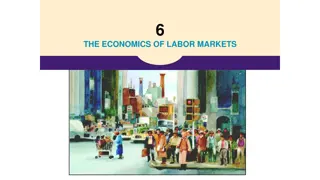Labor Laws and Farmworkers' Rights in Namibia
The Ministry of Labour, Industrial Relations & Employment Creation in the Republic of Namibia enacted the first Labour Act in 1992, which established basic conditions of employment for all employees, including farmworkers. The Act requires employers to provide suitable facilities and housing for employees living on the premises. It also addresses the needs of employee dependents and outlines provisions for agricultural employees. The Act is comprehensive in safeguarding the rights and well-being of farmworkers in Namibia.
Download Presentation

Please find below an Image/Link to download the presentation.
The content on the website is provided AS IS for your information and personal use only. It may not be sold, licensed, or shared on other websites without obtaining consent from the author.If you encounter any issues during the download, it is possible that the publisher has removed the file from their server.
You are allowed to download the files provided on this website for personal or commercial use, subject to the condition that they are used lawfully. All files are the property of their respective owners.
The content on the website is provided AS IS for your information and personal use only. It may not be sold, licensed, or shared on other websites without obtaining consent from the author.
E N D
Presentation Transcript
1 REPUBLIC OF NAMIBIA MINISTRY OF LABOUR, INDUSTRIAL RELATIONS & EMPLOYMENT CREATION
2 1STLAND CONFERENCE S RESOLUTIONS
3 Resolution 10: Farmworkers
4 The 1st Land Conference took place in July 1991and few months thereafter the first Labour Act (Act 6 of 1992) was enacted on 26 March 1992. Part V of the Labour Act established Basic Conditions of Employment that are available to all employees in Namibia including the farmworkers. Section 38 of the Act reads If an employee is by virtue of his or her employment required to live in on the place of his/her employment or to reside on any premises of his/her employer, such employer shall: -
5 (a) (a) provide provide such facilities facilities, , employee employee and, reside reside on such employee employee with as as may may comply and, in in the the case on agricultural agricultural land, with such such housing comply with with the case of of an an employee land, of of his/her his/her housing, , including including sanitary the reasonable reasonable requirements employee who who is is required sanitary and requirements of of such required to to live dependants dependants; ; and water water such live in in or or (b) (b) permit, permit, in in the on on agricultural agricultural land and and to to carry carry on such such employee employee to to provide herself herself the case case of of an land, , such on such such cultivation provide for and and an employee employee who such employee, employee, is is addition, cultivation on on such for the the reasonable his his who is is required required to to live addition, to to keep such land land as as may reasonable needs or or her her live in in or or reside keep such such livestock may be be necessary necessary for needs of of himself himself or or dependants dependants. reside livestock for
6 The provisions of paragraph (b) of subsection (1) shall not apply in relation to an employee who is provided by his/her employer, on such basis as may be determined by mutual agreement, with food or rations or an additional allowance to provide for the reasonable needs of such employee and of his/her dependants. For purposes of this section dependants mean, in relation to an employee, such employee s husband or wife, as the case may be, whether or not such employee is married to him or her, and their or his/her dependent children . (underlining own emphasis)
7 To understand the plight and status of farm workers in Namibia deeply and to give effect to these provisions, the Government in 1997 established a Commission of Inquiry into Labour Related Matters Affecting Agricultural and Domestic Employees chaired by Hon. Dr Zephania Kameeta hence it is known Kameeta Commission .
8 a) Farm workers as pointed out earlier on, have been afforded all the rights and protections under the first Labour Act (Act 6 of 1992) as well as the current Labour Act (Act 11 of 2007). b) Charter of Rights for Farm Workers has not been enacted separately as the Labour Act provides the necessary rights and protection to farm workers. This was influenced by a policy on a single labour legislation that is applicable to all employers and employees and their organizations as the case may be.
9 a) a) Chapter Chapter 3 3 of the current Labour Act makes comprehensive provisions for working hours, annual leave, sick leave, etc. Section 28 makes specific provision on adequate housing and the right to reside on the farm during employment. it reads as follows: -
10 (1) For the purposes of this section a dependant means the spouse and the dependent children of the employee or of the spouse. (2) If an employee is required to live at the place of employment or to reside on any premises owned or leased by the employer, that employer must provide the employee with adequate housing including sanitary and water facilities. (3) If an employee contemplated in subsection (2) lives on agricultural land, the employer must provide sufficient facilities referred to in that subsection to meet the reasonable needs of the employee and the employee s dependants and must either: -
11 (a) permit the employee to keep livestock and to cultivate land to meet the reasonable needs of that employee and the employee s dependants, or (b) in terms of an agreement with the employee (i) provide the employee with sufficient food to meet the reasonable needs of the employee and the employee s dependants or (ii) pay the employee an additional amount to do so.
12 (4) An employer who terminates the employment of an employee who is required to live at the place of employment or to reside on any premises owned, leased or provided by the employer may not require the employee to vacate the said premises or place unless - (a) in the case of an employee residing on agricultural land, the employer gives to the employee three months written notice to vacate; or (b) in the case of all other employees, the employer gives to the employee at least one month s written notice to vacate . (5) If an employee has referred a dispute to the Labour Commissioner alleging an unfair dismissal within 30 days following the termination of employment the employer may not, despite subsection (4), require the employee to vacate the place or premises until the dispute is resolved in terms of Part G of this Chapter or otherwise disposed of.
13 However, as demonstrated in paragraph (4)(a) of the Act, there is a limitation on the residing on the farm after termination of employment. Issues like schooling for children, medical care for farm workers and their families, retirement, grazing rights and pension are not directly legislated under the Labour Act as they are cross-cutting and administered by and through other different Acts of Parliament and various Policies of State. The provision for a living wage, the Labour Act allows for trade unions and employers organizations to negotiate minimum wage and other conditions of employment in different sectors/industries of economy. To this end and in line with the Labour Act and the Kameeta Commission s Recommendation 15, the trade union representing farm workers, Namibia Farmworkers Union (NAFWU) and Agricultural Employers Association (AEA) have entered and concluded a Collective Agreement on Minimum Wage and Other Conditions of Employment in Agricultural Sector in 2014. This Agreement is currently under review by the same parties, and
14 The same Labour Act, has an elaborative provision on Occupational Safety and Health at work place accompanied by a detailed Regulation. These provisions are applicable to all employers and employees regardless of their sectors/industries. The Employee Compensation Act and Social Security Act cover all employees including farm workers. Represented By B.M. SHINGUADJA @ 2nd National Land Conference 2018 WINDHOEK























